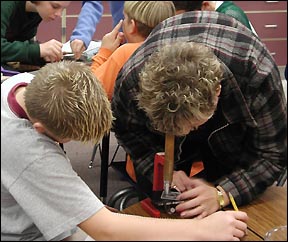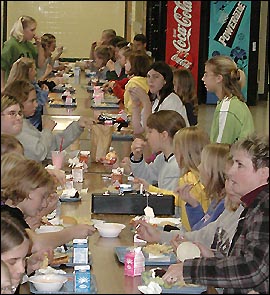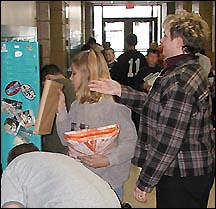Middle school marks 10th year
 Paynesville Area Middle School (PAMS) is celebrating its tenth year with students this fall, but it's hardly a joyous affair.
Paynesville Area Middle School (PAMS) is celebrating its tenth year with students this fall, but it's hardly a joyous affair. In the face of budget reductions that have cut a couple key components of the middle school concept, the staff is faced with a larger worry: the prospect that the entire concept may be on the cutting block if cuts are made again.
Gretchen O'Fallon exmines living creatures found in pond water during a science experiment.
The prospect of more budget reductions came up at the district's public hearing for the proposed excess levy on Monday night, Oct. 29. When asked if the school board had considered any administrative cuts, school board chairman Pat Flanders said, "With declining enrollment, we're going to have to take a look at the whole middle school concept." One way the district could save money would be to eliminate a principal and have one building principal for the high and middle schools.
"It makes it difficult knowing that something you've worked for and built could potentially be taken away, despite its being successful," said middle school principal Deb Gillman, speaking not in fear for her job but for her school. To celebrate the tenth fall for the middle school, which opened in the fall of 1992, and raise awareness about the middle school concept, the school held two days of shadowing for school board members and school board candidates last week.
Middle school concept
The middle school concept hasn't been built overnight. Gillman, who has been at PAMS for nine years, likens it to a home improvement project, where you work little by little and suddenly look back and see the house has been transformed.
Before the new school was built, grades five through eight were located at the elementary school site, in what was also called a "middle school." "It had the name," said Gillman, "but it was actually run like a junior high."
By that, she means that it was run like the elementary school is now, with teachers confined to one grade, students moving in classes, and little inter-grade interaction.
"It was departmentalized by grade level," said Rick Houske, who is in his 29th year of teaching in the Paynesville schools and has taught fifth grade for two decades under the junior high concept, for the last decade as part of an elementary school, and now finds himself teaching sixth grade in the middle school. "And I equate it with a mini-junior high rather than a middle school."
"Fifth graders didn't interact with sixth graders," he added. "Sixth graders didn't interact with seventh graders. Seventh graders didn't interact with eighth graders, other than sharing an art or PE teacher."
The elementary school is still departmentalized by grade. "I was pleasantly surprised when I came out here with the interaction that you have with other grade levels," said Houske.
Parts of the middle school concept include: service learning, where students mix to perform service projects in the community; exploratory days, where students learn new skills on fun, nontraditional days; and Prime Time groups, which Gillman calls the heart of the middle school. "What we want Prime Times to be is to allow students to feel part of a group, because we know that's critical for kids these days," she said.
 Houske said he has already seen these activities build relationships among students, especially among members of different grades.
Houske said he has already seen these activities build relationships among students, especially among members of different grades.
Gretchen at lunch with sixth graders.
Another key element in the middle school concept is common planning time for the core teachers in each grade. This allows the teachers to coordinate its testing schedule, pursue interdisciplinary learning by approaching the same topic in different subjects, and - perhaps most importantly - discuss student progress, said Gillman. By talking about the kids and noticing early signs of struggle, the teachers could be proactive and help students.
Unfortunately, said Gillman, this common planning time was cut during the budget reductions last winter. Already she has noticed its absence, both in the camaraderie it built among staff members and in the focus it gave to identifying problems early. "We're behind on kids," she said.
The middle school also lost its at-risk teacher to budget reductions, which was its first line of defense when a student struggled, Gillman added.
The elementary school aims for a nurturing relationship between students and teachers, Houske said. Students in the elementary school, even fifth graders, travel in classes. They line up and go as a class to lunch, music, and gym. Up until third grade, students are still graded by satisfactory and unsatisfactory ratings on their report cards, grades that measure effort and attitude as well as academic performance.
The middle school concept allows students to grow, to get ready for the demands of high school, and of the real world, with a support system. "So you're learning independence and coming into your own but at a time when you need some of the nurturing aspect," said Houske. "You need someone to care about you and be concerned."
"I really like what it was before," he added, "but this is better for kids."
"Our philosophy is a balance between the kids and the content," said Gillman. While not as forgiving about homework as the teachers in the elementary school, they aren't as demanding as high school teachers either. "We try to ease them into taking responsibility for their work," she said.
For instance, individual planners are not required in the middle school, as students are urged to take the responsibility for writing down assignments from the board. But when a student falls behind, she said, "we use (planners) as a tool for the kids to use if they need it."
Busy day
"I was surprised. They lead a very fast-paced, intense day," said board member Gretchen O'Fallon after shadowing sixth grader Ashley Ogdahl on Thursday. "They don't have much time between things."
O'Fallon said the science lesson, looking at living organisms in pond water through a microscope, was her favorite part of the day. The history test was the most difficult.
 O'Fallon was pleased to get hands-on experience with a number of things, such as a band lesson, singing with the sixth grade, taking an accelerated reading test in the library, and eating a school lunch. "I looked at it as a learning opportunity because I don't have kids in that building anymore," she said.
O'Fallon was pleased to get hands-on experience with a number of things, such as a band lesson, singing with the sixth grade, taking an accelerated reading test in the library, and eating a school lunch. "I looked at it as a learning opportunity because I don't have kids in that building anymore," she said.
Gretchen at the locker of the sixth grader, Ashley Ogdahl, she shadowed last Thursday.
Administrators tell board members to stop by any time, said O'Fallon, but she'd always been a little apprehensive about doing so without the formal invitation. One thing O'Fallon wasn't sold on was the Channel One news program that middle school students watch for ten minutes during Prime Time, feeling that the commercial content was given equal time as the news.
Other school board members and candidates that participated in the shadowing last week were Deb Glenz, Steve Olson, Allen Schmidt, Bob See, and Tami Stanger. Candidates Mark Dingmann, Gary Heineman, and Bob Stoneburner expressed interest in participating but their schedules did not permit them to do it last week. They may try another time.
Several of the board members and candidates chose to shadow their own child in the middle school. Other student chaperones were eighth grader Shawn Reinke and eighth grader Matt Larson, who are members, along with Ogdahl, of the Youth Advisory Council, which meets with the school board to give the board members some student perspective on school issues.
"We chose them because they're the group that meets with the school board," said Gillman. "It's easier to talk with someone you know."
What the middle school staff wants the board - and the general public - to know is the value they see in the middle school concept. "If the referendum doesn't pass, it'll be gone," Houske predicted. "It'd just be a shame because this is a unique experience for kids this age."
Contact the author at paypress@lkdllink.net • Return to News Menu
Home | Marketplace | Community